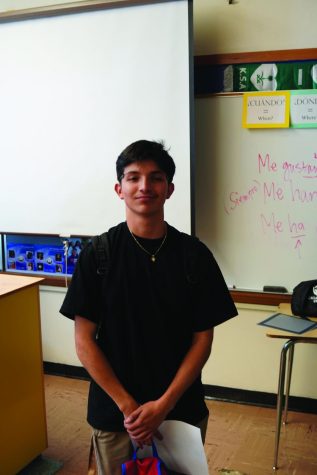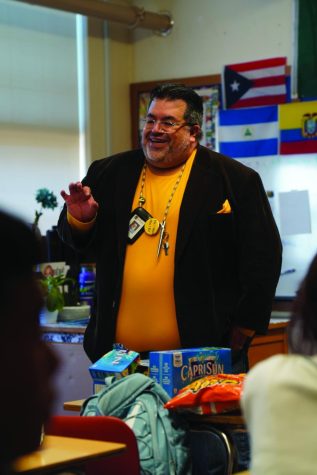The Hidden Diversity Within Our Hispanic Community
GENERATIONAL DIFFERENCES MAKE RETAINING NATIVE LANGUAGE CHALLENGING FOR SPANISH SPEAKING STUDENTS
Junior Omar Moreno, representative of the Latinx Del Oeste Club, was born in the United States. His parents immigrated to the States in their twenties and didn’t know English, so Moreno’s first language growing up was Spanish.
He started going to school and couldn’t speak the language. “No one understood me, and they made fun of me,” Moreno said. He was quickly placed in the English Learning Development (ELD) program and made strong progress, graduating from the program in third grade. But Moreno had a secret technique up his sleeve: like many other kids his age, he was watching cartoons every Saturday morning. “I watched cartoons every day in English, and I learned [that way].”
Moreno would repeat phrases that he heard on shows to his teachers, occasionally getting in trouble, but his teacher would explain what they meant and he picked up a new phrase just like that. His favorite shows were “Courage; the Cowardly Dog”, “Codename: Kids Next Door”, and the original “Teen Titans Go.”

When Moreno joined the Latinx Del Oeste Club, he said it felt like home. He found people who went through the same struggles as him as Latinos, people he could relate to. “I’d try to pronounce the “D” sound and [students] would make fun of me. I remember my cousins, they only spoke English and they’d make fun of me too,” said Moreno.
They had similar struggles, similar triumphs and similar conditions. It was a place he could breathe. Moreno joined the club when it was fairly small, so he progressed to be a representative fairly quickly, but he loved its mission to be a safe space for everyone.
Club Social Media Representative, senior Janet Hernandez was born in the United States. Her parents immigrated to the states roughly 20 years ago.
“It was a big struggle. When my parents immigrated here, they didn’t know anybody. And a big challenge is language,” Hernandez said. “Since they didn’t speak English, it was really hard for us growing up because we didn’t learn English until we started going to school.”
Hernandez learned English through the ELD programs at her school. In her junior year, she watched the Latinx club begin to fade when last year’s seniors graduated. She wanted to preserve a space where Hispanics and people in general could feel safe.
Learning English has been a hurdle for many Hispanic students over the years in more ways than just having to learn a new language. English Learning Development Coordinator Ken Beiser, “They have to kind of segment their day or when I’m at school, I’m speaking English and then I go home, and then I have to speak Spanish.” Language barriers can create rifts between family members, making it difficult for them to talk.
“I know a couple friends that speak really good English, but not as well Spanish,” Hernandez said. “They have a hard time communicating with their parents, grandparents and cousins. And it’s a really hard thing for both, because parents, they teach you Spanish, Spanish, Spanish, but then at schools, it’s not your whole day.”
Beiser explains that for Spanish-speaking students being educated in English, as their English skills grow, they speak less and less Spanish. So for example, if family members who have no reason to know English visit, the student can no longer communicate with them.” Nationwide it’s common for ELD students to be unable to communicate with family. Pew Research data suggests that, “While 61% of Hispanic immigrants in the U.S. are Spanish dominant (and another 32% are bilingual), the share who are Spanish dominant drops to 6% among second-generation Hispanics.”
According to Hernandez, she’s seen her own proficiency in Spanish begin to decline and says that communicating with her own parents and family has become difficult.
“I do struggle with that a lot,’’ Hernandez said, “and it sometimes makes me feel like a bad daughter or just, like, family member in general because they did so much to be able to come here and give me an opportunity, then I can’t even communicate with them. But I think I’ve gotten a little bit better at my Spanish.”This Hispanic experience has been relevant for generations; Hispanic students have been struggling since before the 70s.
GAPS Executive Director of Equity, Inclusion, and Diversity Javier Cervantes talked to the LatinX Del Oeste Club on October 13 and recalls experiencing many of the same struggles that Moreno and Hernandez face during his school experience. Cervantes grew up speaking Spanish in his household and he went into school not knowing English.
“They basically educated the Spanish out of me when I was in school,” Cervantes said. “They wanted us to speak nothing but English, so I started gradually forgetting my Spanish.However, losing touch with Spanish didn’t hinder Cervantes when it came to being with his family.

“Actually, it made me improve my communication with my family because they needed to learn English,” Cervantes said. “So my speaking English to them helped them learn English.”
Around his white friends, Cervantes would get weird looks for speaking Spanish, almost like it wasn’t socially acceptable.
While times have changed significantly from then, Hispanic people are still experiencing many of the same forms of discrimination due to their language. But that’s a large part of why people like Cervantes, Hernandez, and Moreno are in the positions they’re in. They’re in a place where they can encourage, and support other Hispanics. Their support makes it possible for Hispanic people in GAPS to feel like they have a place to belong.